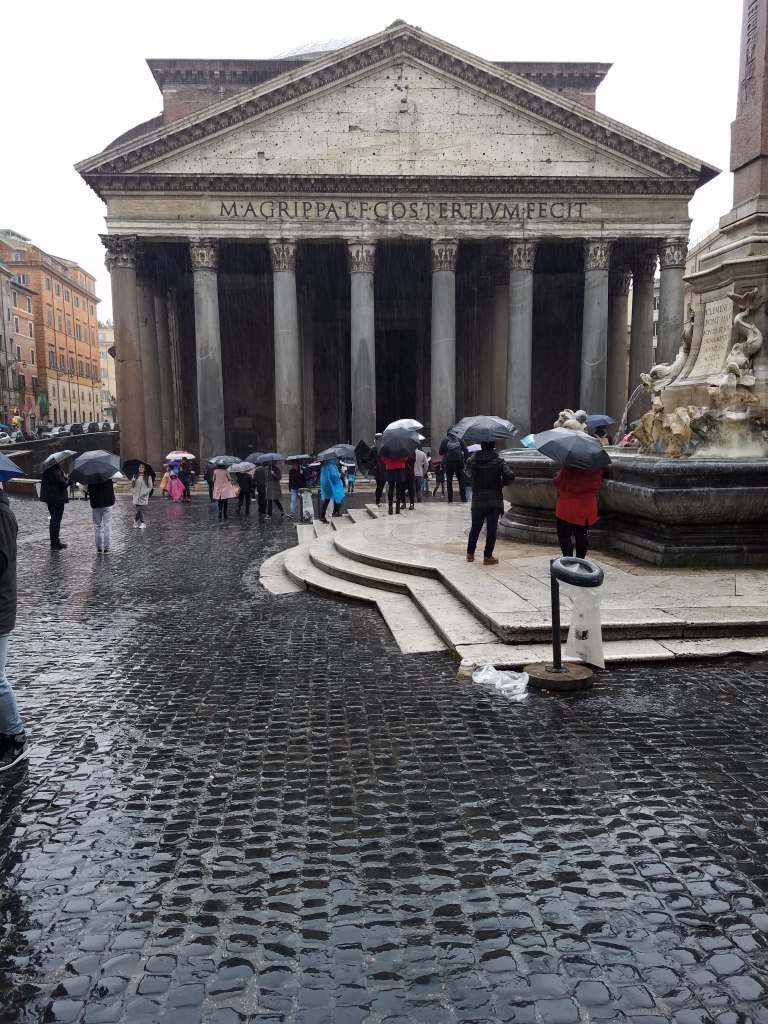
“When you see the Pantheon for the first time, your mind caves in.” – Anthony Doerr
Late last night as the wind howled and rain deluged outside, I reluctantly finished a book I had been trying to slowly savor like a disappearing dazzling sunset. You know what I am talking about? A book, that is so good, has you so invested, that finishing it feels like the end of a special friendship.
The book, Four Seasons in Rome by Anthony Doerr, was a gift from a friend. You will find I have sprinkled through this post some of my Golden Lines from this memoir. Golden Lines is the practice of copying and writing favorite lines, parts or phrases from books you have read in a journal. It is one of my favorite traditions in our home. We first heard of it through classes we took through an online writing company called Bravewriter.
For every book we read in our house, either collectively or individually, we select at least one of our favorite lines from the book, write it in our own Golden Line Journal including the date and age when completed. It is such a beautiful and personal way to chronicle and remember all the literary journeys we have traveled in our lives.

Ironically, as Doerr shares a memoir of his four seasons of his time abroad in the Eternal City, we find ourselves experiencing the most confused season of winter in North Carolina to my memory…record high temperatures, daffodils blooming in January….but, I digress.
My friend gifted this book to me because of my love of one of Anthony Doerr’s other novels, All the Light we Cannot See. Reading historical fiction from the 1930-1940’s European point of view has grown my understanding and appreciation of the complexities of war and how Adolf Hitler and the Nazis were viewed in Europe. I have read books discussing WWII from a French and Italian point of view and found it a mind-expanding experience. Growing up in North America, my understanding of WWII has been only from the point of view of the United States of America.
Initially, my understanding was Four Season’s was a book sharing Anthony Doerr’s experience of writing All the Light we Cannot See. While that is true, I guess. technically it is a life memoir that has very little to do about his writing process, but how he integrates life and being an author at the same time.
A little backstory: Anthony Doerr found out he had won a prestigious writing award that included a stipend and place to stay in Rome for an entire year for the sole purpose of writing (it didn’t even have to be published!) THE DAY his wife came home from the hospital with newborn twins. Twins, ya’ll. Twins.
The book depicts what it was like for a new father, husband and writer to pack up a life in Boise, Idaho and travel across the pond to live for a year in Rome, Italy. Although I wasn’t physically in Rome this time, this book was a gift of time-travel instead.
Reading the Four Seasons in Rome was like closing your eyes and opening a mental scrapbook in your mind.
As an author, there are moments in Four Seasons where he describes different aspects of Rome with such vivid description and captures the city in a way only one could if you were actually sitting on The Spanish Steps – Piazza di Spagna (18th century) in front of the Barcaccia Fountain (17th century). Even though some websites indicated that you are no longer allowed to sit, eat or drink on the steps during our visit in 2018, the stairs were full of visitors and was a popular place for people to meet, sit, rest and enjoy the city.
There was a no food or drink rule that was strictly enforced. (I just read they have reinforced this same ordinance at the Fountain of Trevi. While I understand the intention, based on our experiences of that iconic fountain, I cannot imagine how they would enforce during tourist season!) Legend has it, toss a coin in the Trevi and you are assured a return trip to Rome!
In particular, there were two experiences Mr. Doerr described with such truth it made me pause – reflect – smile and feel a longing to return.
The first was his description of the Pantheon. The day we visited the Pantheon it was cold and raining. A misty soft cold rain. The wet streets full of people walking with umbrellas and rain jackets going to and from their various destinations. When walking in Rome (like many places in Europe) it is not uncommon to be twisting and winding through the streets and then come upon an ancient ruin, church or building. The Pantheon is the burial place of kings, queens and artists.



When we came around the corner the Pantheon was a building so impressive it forces one to pause and take in her grandeur. I believe she is one of the oldest ruins in Rome (built around 125AD) and still standing with massive columns out front, huge wooden doors open to the public and the building is built in a circular shape.



It was originally built as a temple with an oculus (a round or eye-like opening) in the top of the dome to allow a direct conduit between Rome and the gods. The oculus is open, no window, no covering – like an eye to the heavens. In the book, the author shares his longing to see snow enter the Pantheon through the oculus and I can completely understand his desire.

It was raining when we visited the Pantheon. The oculus is the only source of light. Standing under the oculus watching the rain fall straight into the center of the Pantheon was a magical, mesmorizing moment. I have included some video we took, not the best quality, but if you look closely you can see the rain coming right inside the building. The oculus is huge – the diameter is 26 feet across and is the world’s largest unreinforced concrete dome.
The architecture is mind-boggling and it is almost impossible watching rain falling through the same opening to the skies that has been exposed to all the elements for over 2000 years– It is a sight to see. You find yourself in awe and wonder of times long ago that ruins still allow for one to imagine today.
“The Pantheon forces you to pay attention to the fact that the world includes things far greater than yourself.” Four Seasons in Rome, A. Doerr
The second experience Mr. Doerr describes in the book is witnessing the starlings fly in their orchestrated swirling flight in the skies over Rome.
“Tonight there are three flocks. They stretch into quarter-mile bands, winding apart, then slowly snapping back together. In one minute they are three separate helices, a heart, a velvet funnel, two falling scarves. A flock sings closer to us, a shower of black against blue, plunging in coordination – suddenly a thousand birds turn their wing tips to us and are gone.” Four Season in Rome – A. Doerr
The day we explored the Jewish Ghetto (originally called the Roman Ghetto), established around 1555, all five of stood in absolute amazement at how thousands upon thousands of these birds danced and swirled through the sky – the author describes how he witnessed many Romans stop looking up at these configurations of flocks of birds and sometimes wonders why the birds even do it anymore (if no one is watching).
If you visit Rome, consider touring the Jewish Ghetto. Historically, it is one of the oldest Jewish communities in all of Europe has much to offer in the form of education and understanding. From the stores, to the bakeries, to the synagogues (one of the largest in all of Europe), we very quickly witnessed that the Jewish Ghetto is a thriving community today.
Sadly, this was not always the case. During the German occupation in 1943 Jews were promised that if they could gather enough gold ransom, they would be spared deportation to concentration camps. Despite raising the requested amount (and it has been reported the Vatican helped raise these funds as well) over 1500 of the Jewish residents were rounded up and deported – less that 20 Jews survived.
If you have traveled or are considering traveling to Rome in the future, this book will either take the reader on a walk down memory lane and cause one to yearn to return or inspire one to book a trip to visit the Eternal City today.
“You find your way through a place by getting lost in it.” Four Seasons in Rome, A. Doerr
Until next time, RockonLIVING friends,
Vickie


